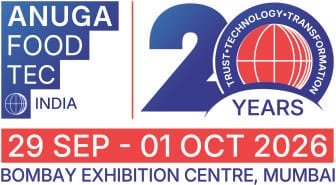Eighteen percent GST (Goods and Services Tax) on agri produce will only mar the growth food processing industry. This was opined by the All India Association for Food Processors Association (AIFPA). All the processed ready-to-eat foods are at 20 percent GST. This was learned at the 75th annual conference, award function and national seminar of the All India Food Processors’ Association (AIFPA), which took place recently in Bengaluru.
“We are aware that production cost is high, but the government is still charging 18 percent GST for packaged foods. Now the government does not want to reduce the packaging duty among others, and it is going to be difficult to process the farmers’ produce, which has resulted in a slowdown in the economy,” said Dr S Jindal, president, AIFPA, and managing director, Excelsior Food and Chemical Industries.
At the national seminar on Strategies for Boosting Growth of Food Processing Industry in the Country, experts deliberated on the impact of GST, challenges in food processing, and the woes of the farmers.
Present on the occasion was Rameswar Teli, minister of state for food processing industry, who said that India was home to 40 food parks. “Not much work was happening, despite the subsidy that was given to the stakeholders,” he added. Going by the slowdown and its impact on the industry, the minister said that his ministry was open for a dialogue to iron out issues. “Considerable pressure was put on the government and the GST Council that if the country was hard-pressed for funds, then it could increase levy on all other items, except food,” he said.
“There are a slew of issues impacting the food processing industry like silos of decision making, focus on wrong priorities and not relating to the ground realities,” said Dr Jindal. “The food processing industry has asked the government several times that it will need to be consulted in these matters. It is high time the government supports food processing projects to prevent farmers’ penury. Efforts like opportunities to process tomato when there is a glut in the market would go a long way supporting the farmers’ livelihoods,” he added.
Sanjay Singal, chief operating officer, ITC, said, “The adoption of technology would bring in considerable transparency in operations from farm to shelf. There are several technologies for pre-harvest and post-harvest. Technology helps food manufacturers to produce more efficiently and the adoption of software ensures consistent quality.”
In his keynote address, Dr Chindi Vasudevappa, vice-chancellor, NIFTEM, said, “There is a need to promote traditional foods along with the modern processed products.” “These could be in the areas of dairy processed products or novel and nutritional foods. The Make in India culture will prove Indian food manufacturers robustness in the years to come,” he added.
Food processing industry also seeks 20% export incentive
The food processing industry has asked the government to give an export incentive of 20% under the Remission of Duties or Taxes on Export Product (RoDTEP) scheme.
“The food industry is under severe economic pressure owing to uncertainties, perishability of food products and sudden price spikes in agri commodities. To increase the processing level of fruits and vegetables from the current 10% to 80% as in many developed countries and boost export, the news scheme – RoDTEP – should be introduced urgently as exports are losing viability,” said All India Food Processors’ Association president Subodh Jindal.
He said that they have also requested the government that the new scheme should provide benefits similar to the Merchandise Exports from India Scheme (MEIS) scheme at 20% and not reduce the incentive on exports.
Jindal said that this will strengthen the farm economy and realise the objectives of doubling farmers’ income and the Make in India policy.
With rising food prices causing substantial negative socioeconomic effects and political unrest, Jindal said that there was a need to lower the GST. “It is an accepted global practice that food products are either exempt from tax or chargeable at a minimal rate.
The high taxes on branded food products has led to an increased sale of food in loose form which is unsafe and unhealthy. This has also reduced consumption of packaged food, said Jindal.
The association has also recommended that new units be provided with a five-year tax holiday irrespective of the location of the unit.
“The industry plays an important role in saving perishable agri produce and provides value addition. A tax holiday will ensure that entrepreneurs can set up units at their locations and do not have to trans-locate themselves to distant places which incur high overheads and logistics expenses,” said Jindal.
ALSO READ:















